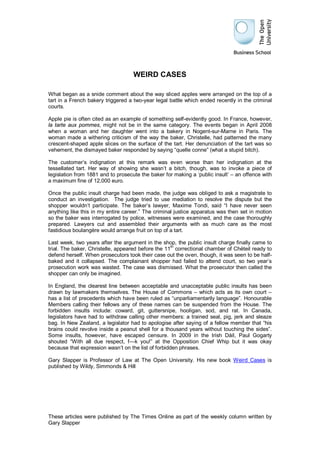
Day 8 weird cases - la tarte aux pommes
- 1. WEIRD CASES What began as a snide comment about the way sliced apples were arranged on the top of a tart in a French bakery triggered a two-year legal battle which ended recently in the criminal courts. Apple pie is often cited as an example of something self-evidently good. In France, however, la tarte aux pommes, might not be in the same category. The events began in April 2008 when a woman and her daughter went into a bakery in Nogent-sur-Marne in Paris. The woman made a withering criticism of the way the baker, Christelle, had patterned the many crescent-shaped apple slices on the surface of the tart. Her denunciation of the tart was so vehement, the dismayed baker responded by saying “quelle conne” (what a stupid bitch). The customer’s indignation at this remark was even worse than her indignation at the tessellated tart. Her way of showing she wasn’t a bitch, though, was to invoke a piece of legislation from 1881 and to prosecute the baker for making a ‘public insult’ – an offence with a maximum fine of 12,000 euro. Once the public insult charge had been made, the judge was obliged to ask a magistrate to conduct an investigation. The judge tried to use mediation to resolve the dispute but the shopper wouldn’t participate. The baker’s lawyer, Maxime Tondi, said “I have never seen anything like this in my entire career.” The criminal justice apparatus was then set in motion so the baker was interrogated by police, witnesses were examined, and the case thoroughly prepared. Lawyers cut and assembled their arguments with as much care as the most fastidious boulangère would arrange fruit on top of a tart. Last week, two years after the argument in the shop, the public insult charge finally came to th trial. The baker, Christelle, appeared before the 11 correctional chamber of Chéteil ready to defend herself. When prosecutors took their case out the oven, though, it was seen to be half- baked and it collapsed. The complainant shopper had failed to attend court, so two year’s prosecution work was wasted. The case was dismissed. What the prosecutor then called the shopper can only be imagined. In England, the clearest line between acceptable and unacceptable public insults has been drawn by lawmakers themselves. The House of Commons – which acts as its own court – has a list of precedents which have been ruled as “unparliamentarily language”. Honourable Members calling their fellows any of these names can be suspended from the House. The forbidden insults include: coward, git, guttersnipe, hooligan, sod, and rat. In Canada, legislators have had to withdraw calling other members: a trained seal, pig, jerk and sleaze bag. In New Zealand, a legislator had to apologise after saying of a fellow member that “his brains could revolve inside a peanut shell for a thousand years without touching the sides”. Some insults, however, have escaped censure. In 2009 in the Irish Dáil, Paul Gogarty shouted “With all due respect, f—k you!” at the Opposition Chief Whip but it was okay because that expression wasn’t on the list of forbidden phrases. Gary Slapper is Professor of Law at The Open University. His new book Weird Cases is published by Wildy, Simmonds & Hill These articles were published by The Times Online as part of the weekly column written by Gary Slapper
